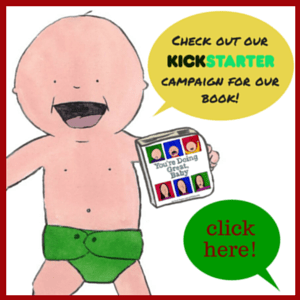 I had some unhelpful things said to me when I was a new Mum that have rung in my ears for five and a half years.
I had some unhelpful things said to me when I was a new Mum that have rung in my ears for five and a half years.
I may never forget them, but with time they are losing their power. In some ways a new mother is as fragile and vulnerable as their tiny baby.
The power dynamic between people makes a big difference to how a comment is taken. Comments from people in positions of power, such as health professionals and elder family members, can be particularly hurtful.
The two comments that have haunted me the most are to do with breastfeeding, and they were both said to me by people in a position of power.


I felt deep shame about not being able to breastfeed Leo exclusively due to what was eventually diagnosed as Insufficient Glandular Tissue (IGT). My condition made me feel like I wasn’t a proper woman and had no right to be a mother, so those comments cut me to the bone.
Often the comments that hurt the most are the ones that connect with an insecurity you already had. It’s like they agree with the critic you carry on your shoulder that tells you you’re a crappy Mum/Dad/person.

Passing comments from well meaning family, friends or strangers along the lines of ‘enjoy every second’ can make you feel like an ungrateful bitch if you are not having a great time.
Often if you talk to the person telling you to enjoy every moment, they will be only to happy to talk about the times they themselves didn’t enjoy every moment. It is so easy to forget the power of that early time and everything going on for new parents. I am guilty of this myself – babies and little kids look so cute that you forget how intense life with them can be and how they can push any parent to their limits.
Sometimes innocent questions like “have you tried leaving them to cry/giving them a dummy/hanging their cot from the ceiling from an elephant’s tail” can drive a new parent INSANE! Too. Many. People. Telling. Me. What. I. Should. Do.
What I am learning over and over again is that comments like those above – that are either designed to hurt, or not designed to hurt but they do – often say more about the person saying them and their preoccupations and issues, than about the person it was said to. It’s not about you, it’s about them.
Some comments people made to me about how much their baby slept or fed or ate or pooed or cooed induced pangs of guilt or fear in me. Once again, they were unhelpful without meaning to be. Those comments rang in my ears too, but not as much as comments levelled directly at how I was doing as a mum or how my baby was doing.
Comparison of yourself to others is probably worthy of a whole post of its own. By the way, please let me know if you want to write something about comparison (or anything) for the blog! Would love to have some guest posts. 🙂
Did you have something really unhelpful said to you when your baby was small (or at any stage in parenthood) that you’d like to get out of your mind?
People say great stuff too! I’ve also written about the helpful things people say to new parents.
One thing we were sure of when writing You’re Doing Great, Baby was that we didn’t want to be giving advice on how to feed, settle or take care of your baby. We hope this gives people room to see themselves in the characters and that no-one is made to feel guilty by our book.



























